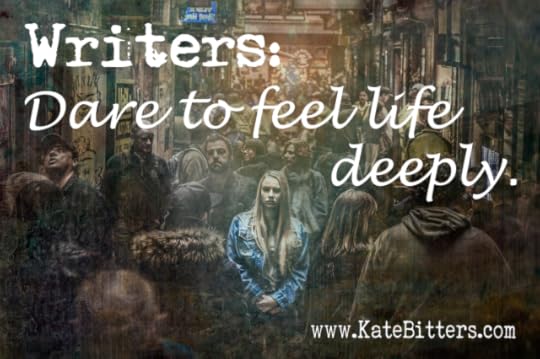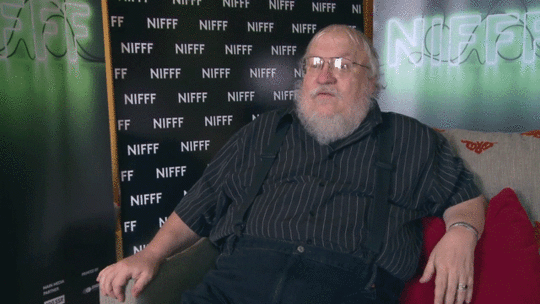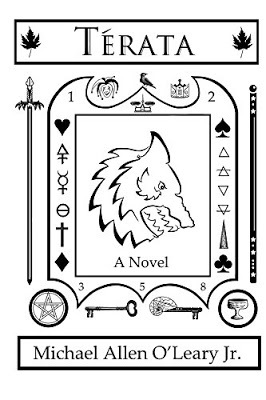Kate Leibfried's Blog
October 16, 2017
The Bitter Blog has a new home!

Hello, all!
In order to simplify my life, I've integrated the Bitter Blog into my new website.
If you're on the email list, you've already been transferred over. No worries.
If you'd like to sign up, please visit my new Subscription Page.
Thank you for your loyalty. I'll see you on KateBitters.com!

Published on October 16, 2017 11:26
September 20, 2017
Writers: Dare to feel life deeply

Memorable writing is provocative writing. It challenges our thinking; it creates emotional swells. Memorable writing puts us in a place and allows us to see, smell, touch, taste the surroundings. We’re there. We’re feeling the feels. We’re inside the character’s head.If a writer is able to create such a vivid world, they likely exist in such a world. They feel it deeply.These are the writers who go out into the world and dare to remove the barbed wire and cement walls around their hearts. Their circulatory systems beat freely. They allow themselves to get hurt, or to feel full-body joy.They question with the curiosity of a child. They observe. They see the crushed bug on the sidewalk, the shaking hands of a junkie. They hear tires screech or an ambulance blaring down the road and wonder what happened, what tragic events unfolded.In my own life, my dullest writing typically occurs when I’m completely enmeshed in work, glued to my desk, clicking through my routine. I have to remind myself to get up, step away, experience life instead of writing about it. I find that writing comes easier after I’ve gone out and allowed myself to feel deeply. Words flow with emotions. Conversely, if I’ve been sitting at my desk for hours, days in a row, I have to mine memories from my brain—I have to base my writing off the echoes of experiences, instead of diving into the rawness of life and reflecting on it immediately afterward.

Sometimes life knocks me on my back and I am overcome by the evil or compassion or creativity that I witness. But it is precisely these knocks that make my writing repertoire stronger. These knocks add to my experiences. They fill my internal image bank, so I can spend some time away from life, locked in my office, writing.But I have to return, as any writer does. Because you can’t become a memorable writer if you only watch the world through television, movies, and books. The originality won’t be there. Your personal lens will be clouded by others’ perspectives.
It’s essential to go out, seek experiences, and live life deeply. If you choose to see the depth of your surroundings—the richness of humanity, the texture of nature, the sounds of industry—even your most mundane excursions will build your writing chops.

Kate Bitters is a freelance writer, founder of Click Clack Writing, and author of Elmer Left and Ten Thousand Lines. She regularly writes stories on the Bitter Blog. Subscribe to follow her journey.
Published on September 20, 2017 07:00
July 14, 2017
An Open Letter to George R. R. Martin
 Dear Mr. Martin,With the next season of Game of Thrones (GOT) around the corner, I’ve been thinking a lot about dragons and wildfire and tiny not-quite-adults who kick a lot of ass.And I’ve been thinking about you.You’re a living legend in some people’s eyes, right up there with J.R.R.T. But for every word of praise you receive, you’re harangued ten times over. You’re criticized for buying old movie theaters instead of attending to your writing. You’re labeled a “sell out.” You’re blasted for your casual portrayal of rape and incest (no denying that one). People have told you to hurry up and finish GOT before you croak (to which you’ve aptly replied with a big ol’ F$&% You).
Dear Mr. Martin,With the next season of Game of Thrones (GOT) around the corner, I’ve been thinking a lot about dragons and wildfire and tiny not-quite-adults who kick a lot of ass.And I’ve been thinking about you.You’re a living legend in some people’s eyes, right up there with J.R.R.T. But for every word of praise you receive, you’re harangued ten times over. You’re criticized for buying old movie theaters instead of attending to your writing. You’re labeled a “sell out.” You’re blasted for your casual portrayal of rape and incest (no denying that one). People have told you to hurry up and finish GOT before you croak (to which you’ve aptly replied with a big ol’ F$&% You).
 I want to talk about one specific criticism — the accusation that you’re doing everything in your power to avoid writing.I get that fans want their big payoff — a series wrap-up — before every Tom, Dick, and Harry with an HBO Go account gets it. That’s their reward, they claim, for sticking with you since the beginning.But, as a writer, I also understand YOU.I understand why you’re not writing (at least not the story that we all want you to write).You worked your tail off for years, spinning a web more complicated than one woven by a spider on peyote. You earned your place in fan’s bookshelves and conversations.Finally, your decades of excruciating plot mapping, late night writing, and fan-building reached a head in 2014. Your story exploded into public consciousness with a flick of the magic HBO wand.Every writer’s dream, right? To be picked up by Steven Spielberg or by a major TV network?You’d finally arrived. After years of tormenting yourself over every complex character profile and story line, you became a household name, a Twitter trend. You picked up millions of new fans…and millions of dollars.And you finally wanted to rest — or at least do something else for a while. You earned it, didn’t you? Writing is hard, dammit! It’s time consuming and tedious at times (especially if you have to keep track of dozens upon dozens of character motives and plot lines!).I get it, George. I don’t pretend to be a big-time author, but I’ve upped my game with every novel or short story I write. I’ve become brutally hard on myself, to the point of paralysis. I’ve started to question every word choice, every scene. Is this line superfluous? Is that character coming across as I intended? My pickiness has made me wonder if my current WIP will ever see the light of day (the last manuscript is festering in the proverbial drawer).If you’re anything like me, you’ve also grown increasingly self-conscious of your writing. You cringe over the little flaws others point out. You hold yourself to impossible expectations that tower over you like the vertiginous Wall.Not to mention, millions of eyes are watching you. Millions of mouths are ready to criticize your story.But, no pressure. Just write the damn thing.George, I understand. I may not like that the TV show is gobbling up Westeros and taking over the story. I may squirm at the thought of an open-ended book series, never finished. But I do understand.In many ways, your story no longer belongs to you. It’s been wrested from your hands by fan forums, TV interpretations, and a whole host of people with opinions. It belongs to the world now, and you’re probably wondering if the world really needs you to finish the story.Aren’t we authoring the story on our own? Wouldn’t your voice be one in a roaring chorus?Although that may be true, George, I argue that your voice is stronger than all of ours combined. You were the original soloist, and we all joined the choir once we realized you are damn good at singing.Despite the pressure, despite the drudgery you’ll face in tying all the story lines into neat ribbons, I hope you’ll do it. I hope you’ll keep up your F$&% You attitude and write the end of your story, despite all of us.Sure, you have little incentive to do it. You don’t need the money or fame. You’ve already divulged your ending to HBO. Writing the final two books, then, would be an entirely selfless act — a gift to your fans.But it would cement your legacy in a way the TV series never could.You write about bravery, despite fear. Now is the time to pick up your sword and start swinging.
I want to talk about one specific criticism — the accusation that you’re doing everything in your power to avoid writing.I get that fans want their big payoff — a series wrap-up — before every Tom, Dick, and Harry with an HBO Go account gets it. That’s their reward, they claim, for sticking with you since the beginning.But, as a writer, I also understand YOU.I understand why you’re not writing (at least not the story that we all want you to write).You worked your tail off for years, spinning a web more complicated than one woven by a spider on peyote. You earned your place in fan’s bookshelves and conversations.Finally, your decades of excruciating plot mapping, late night writing, and fan-building reached a head in 2014. Your story exploded into public consciousness with a flick of the magic HBO wand.Every writer’s dream, right? To be picked up by Steven Spielberg or by a major TV network?You’d finally arrived. After years of tormenting yourself over every complex character profile and story line, you became a household name, a Twitter trend. You picked up millions of new fans…and millions of dollars.And you finally wanted to rest — or at least do something else for a while. You earned it, didn’t you? Writing is hard, dammit! It’s time consuming and tedious at times (especially if you have to keep track of dozens upon dozens of character motives and plot lines!).I get it, George. I don’t pretend to be a big-time author, but I’ve upped my game with every novel or short story I write. I’ve become brutally hard on myself, to the point of paralysis. I’ve started to question every word choice, every scene. Is this line superfluous? Is that character coming across as I intended? My pickiness has made me wonder if my current WIP will ever see the light of day (the last manuscript is festering in the proverbial drawer).If you’re anything like me, you’ve also grown increasingly self-conscious of your writing. You cringe over the little flaws others point out. You hold yourself to impossible expectations that tower over you like the vertiginous Wall.Not to mention, millions of eyes are watching you. Millions of mouths are ready to criticize your story.But, no pressure. Just write the damn thing.George, I understand. I may not like that the TV show is gobbling up Westeros and taking over the story. I may squirm at the thought of an open-ended book series, never finished. But I do understand.In many ways, your story no longer belongs to you. It’s been wrested from your hands by fan forums, TV interpretations, and a whole host of people with opinions. It belongs to the world now, and you’re probably wondering if the world really needs you to finish the story.Aren’t we authoring the story on our own? Wouldn’t your voice be one in a roaring chorus?Although that may be true, George, I argue that your voice is stronger than all of ours combined. You were the original soloist, and we all joined the choir once we realized you are damn good at singing.Despite the pressure, despite the drudgery you’ll face in tying all the story lines into neat ribbons, I hope you’ll do it. I hope you’ll keep up your F$&% You attitude and write the end of your story, despite all of us.Sure, you have little incentive to do it. You don’t need the money or fame. You’ve already divulged your ending to HBO. Writing the final two books, then, would be an entirely selfless act — a gift to your fans.But it would cement your legacy in a way the TV series never could.You write about bravery, despite fear. Now is the time to pick up your sword and start swinging.
 Kate Bitters is a freelance writer, founder of Click Clack Writing, and author of Elmer Left and Ten Thousand Lines. She regularly writes stories on the Bitter Blog. Subscribe to follow her journey.
Kate Bitters is a freelance writer, founder of Click Clack Writing, and author of Elmer Left and Ten Thousand Lines. She regularly writes stories on the Bitter Blog. Subscribe to follow her journey.

Published on July 14, 2017 10:23
July 11, 2017
Book Review: Térata by Michael O'Leary
 Térata book cover, by Michael O'Leary
Térata book cover, by Michael O'LearyWhen I read a monster book, I look for just the right amount of gore, mystery, and (in many cases) empathy with the beast. Térata, by Michael O'Leary, delivers all of that...except there are a dozen monsters instead of one (more, if you count the cast of mutant/superhuman characters known as the Awakened).
O'Leary takes us through a complicated alternative world where the Térata--monstrous shape-shifting creatures born in a lab--lurk in parks and auto dealerships, humans are able to realize alternative powers, and magic coexists with science.
The Térata were engineered to be emotionless creatures who obey orders without question. But something disrupts the militant mindset of a single Térata, "Number 1," and that disruption spins us down a rabbit hole filled with tarot cards, supernatural beings, an alternative universe, mutiny, and yes, murder. Plenty of murder.
Many characters cross paths with Number 1 and his disrupter--plot lines and fates intertwining in an arena known as the Confluence. It's sometimes difficult to keep up with all the characters and their motives (and some of them have unsatisfactory fates), but O'Leary manages to tie the many paths together at the end of the story.
In the world of Térata, humor exists among the terror, creatures cry (or have messy monster sex), and little girls are not always as innocent as they seem. It's a world as complicated as our own, which makes it plausible and easy to sink your teeth into.
If there's one complaint I have, it's that some of the characters in this tale seem to get out of their sticky situations with too much ease. A knick-of-time rescuer or a conveniently-placed tool gets them out of trouble and they move on without much reflection on how their lives were nearly lost.
Térata moves us through a many-layered world, filled with imaginative interactions and complicated plot lines. It's a raw kind of book--one that takes risks and forces the reader to suspend disbelief. Some of the writing is untidy, but it is, after all, a monster book. Full of slashing claws, fangs, and pheromones.
If you're looking for an inventive read, a cast of morally ambiguous characters (think Walter White or Frank Underwood), and a healthy dose of terror, give Térata a go.

Kate Bitters is a freelance writer, founder of Click Clack Writing, and author of Elmer Left and Ten Thousand Lines. She regularly writes stories on the Bitter Blog. Subscribe to follow her journey.
Published on July 11, 2017 04:30
July 7, 2017
Ideas Are Like Ankles

Today, I left my house to go for a very ordinary midday run. Out the door, to the right, down the street. Perfect weather to be outside.
It lasted .38 miles.
That's when my foot hit the edge of the sidewalk, my ankle wobbled, and I came crashing down, skidding my right hand and knee in the process.
"Workout paused," said my running app.
Ideas are like ankles.They can pop at any moment. They cause us to react, to pay attention.
Ideas are like ankles--they are only a small fraction of the larger picture. You rely on your ankle for support, but you also rely on your stomach, your brain, your cardio-vascular system.
In the same way, your idea on its own is not enough to craft your story. You need lots of other meat: an outline, a first draft, a first-round edit, peer reviews, a rewrite, another rewrite, another rewrite...
Ideas are like ankles--they can wobble sometimes. They can be faulty. They can completely crack. But if you stick by your idea/ankle, it will mend. If it's a strong enough idea, it will withstand pressure and obstacles.
Ideas are like ankles--they need care. Tend to your idea. Buy it a nice pair of shoes with adequate support. Let it know you honor and appreciate it. Don't just let it sit on its own--grab your idea and run with it!
As I sit here with my leg elevated and my foot numb from ice, I'm thinking about all the ideas I have failed to nurture and support. Were those ideas strong enough to grow legs? Could they have learned to run?
Although our ankles/ideas seem like fragile things, they are stronger than we often recognize. Give your ankle a massage today.

Kate Bitters is a freelance writer, founder of Click Clack Writing, and author of Elmer Left and Ten Thousand Lines. She regularly writes stories on the Bitter Blog. Subscribe to follow her journey.
Published on July 07, 2017 15:12
June 27, 2017
Let's talk about character names.
I recently finished reading a book in which a large number of the character names began with the letter K. There was Kevin, Katrina, Karl, Kenneth. My head reeled as I worked my way through the pages. “Who is doing what now?” I’d ask myself.
“Whose brother is that?”
“Wait…isn’t Karl the one with super human strength? Or was it Ken?”
To add to my confusion, there were a wholelotta (that’s a word, right? You saw it here first!) characters in general. And everyone had a name, even a random plumber who appeared in the book for a single page.
I wanted to like the book. The plot was compelling and original, the writing descriptive. The writer added poignant moments of tension and kept us guessing about the fate of our hero until the bitter end. BUT…
The stew of similar characters was confusing to the point of distraction. I felt alternately confused and annoyed as I read. And that simply shouldn’t be. Characters are meant to be enjoyed. We are supposed to root for heroes, revile the bad guys, and laugh at pranksters. Minor characters are meant to support—to propel us through the story. They can’t serve their purpose if we can’t remember who is who.
Part of distinguishing between characters has to do with character attributes, but another part is much more simple: their names. How do you name a character? When do you name a character?
I’ve boiled it down to four main guidelines:1. Don’t name your “just passing through” characters.Don’t give the cashier in a grocery store, the bank teller, the minion in an army of ten thousand a name unless she plays an important role in the story. If you need to add a character to propel your plot forward, consider assigning that character an adjective. For instance, if a thief with a buzz cut appears for one scene and robs your protagonist, call him Buzz Cut. If an auto mechanic with a sleeve of bird tattoos fixes your protagonist’s car, call her Bird Tattoos. Here’s how it could play out:
Gina was greeted by her usual mechanic, a woman with an unusually pointy chin and a full sleeve of bird tattoos that flew and clawed their way up her arm.
“Hey, Gina. I’m surprised to see you back so soon.” Bird Tattoos approached the vehicle and gave it a loving pat.
ALTERNATIVELY: You don’t have to give these characters a name at all. The cashier can simply be “the cashier.” The pony that appears for one scene can simply be “the pony.”
2. Don’t use similar names.Even if they are clear in your mind, your characters named John and Joe will get mixed up in the mind of your reader. Most of us skim over sentences and only take in major details. Having characters with similar-looking names will likely give your reader pause, which is never a good thing. Any time a reader stumbles, he is pulled out of the story. It doesn’t matter if it’s for a fraction of a second—we’re going for full immersion, people!
3. Get creative.Say what you will about JK Rowling’s writing, but her characters are fantastic. They are memorable, unique, and they have original names that stick with you long after you’ve finished reading: Horace Slughorn, Luna Lovegood, Remus Lupin, Cedric Diggory, Belatrix LeStrange.
Brilliant. Even though she gives us tons of minor characters, they are compelling and have distinct names.
4. Fit the name to the character.Rowling not only gives us creative, original character names, she also tends to fit the name to the character. Professor Sprout is the herbology teacher. Dolores Umbridge reminds us of the word umbrage, which means “offense or annoyance.” Luna Lovegood is nicknamed “Loony,” which fits her airy, lives-on-a-different-plane attitude.
Fitting your name to your character helps leave an instant impression on your reader. Christian Gray in Fifty Shades of Gray, is a mysterious individual (gray, shadowy) with gray morals. I don’t claim to be a fan of the book or of E.L. James’ writing style (I struggled to make it halfway through book one), but the lady left an impression. She created a character that sticks and part of that sticking power is through his name.
Keep in mind, you can try a different tact and assign a character a name that doesn’t fit at all. A vampire could be named Solarte. A meaty-armed man could be nicknamed Tiny. A bumbling, unlucky idiot could be called Mr. Powers.
Either way, you’re leaving an impression.
Naming (or choosing to not name) your characters is important. They breathe life into your story—shouldn’t you honor the important ones with a fitting name?
BONUS: What are some of your favorite character names? Here are some distinct ones that come to mind:Professor X (and most X Men characters)Doc Ock (and most Spiderman characters)HeathcliffAtticus FinchHumbert HumbertHamletDr. JekyllPippi LongstockingDr. FrankensteinSherlock HolmesKatniss EverdeenTheon GreyjoyBilbo BagginsEbenezer Scrooge

Kate Bitters is a freelance writer, founder of Click Clack Writing, and author of Elmer Left and Ten Thousand Lines. She regularly writes stories on the Bitter Blog. Subscribe to follow her journey.
Published on June 27, 2017 05:46
March 28, 2017
Presenting...EPIC FANTASY *With Dragons

Author Stephen Swartz has just released a new book, EPIC FANTASY *With Dragons, which promises to be even more compelling and inventive than his Dream Land series. Swartz is the author of several novels of literary fiction and science fiction. His novels usually feature exotic locations, foreign characters, and smatterings of other languages.
Epic Fantasy (*With Dragons) has all the features of a, well...EPIC adventure. There are brave knights, cannibalistic women, mysterious cities, and yes...many, many dragons.
 Author Stephen SwartzOn first blush, this book seems to be a typical fantasy adventure, with princes and princesses, a hero, and a quest which could change the fate of the world. However, it's the humorous details and tongue-in-cheek style of writing that sets this book in a class of its own. From "pack giraffes" to a city which values deformation, Swartz' writing teems with originality.
Author Stephen SwartzOn first blush, this book seems to be a typical fantasy adventure, with princes and princesses, a hero, and a quest which could change the fate of the world. However, it's the humorous details and tongue-in-cheek style of writing that sets this book in a class of its own. From "pack giraffes" to a city which values deformation, Swartz' writing teems with originality.Here is a brief synopsis of Epic Fantasy (*With Dragons). Find your copy on Amazon.com.
CORLAN, MASTER DRAGONSLAYER, the best in the Guild, the best in the Burg!
And yet, returning from his latest expedition, Corlan discovers jealous rivals have conspired with the Prince to banish him from the city.
Sent into the Valley of Death, Corlan conjures a plan. He and his new sidekick, a runaway boy from the palace kitchen, will trek the thousand miles to the far end of the valley, where a vast marsh provides nesting grounds for the dragon horde. Once there, Corlan vows to smash dragon eggs and lance younglings, ending dragon terror once and for all time.
And yet, as dangers, distractions, and detours harry him along the way, Corlan learns ancient secrets that threaten to destroy everything in his world. Even with the aid of wizards and warriors, he must use all his guile, his bravado, and the force of his stubborn will just to survive - and perhaps return home - no matter how the gods challenge him with their harshest tests.
Author Stephen Swartz has published poetry, stories, essays, and articles for scholarly journals in the U.S. and Japan. He is the author of nine novels. Currently, Swartz is a Professor of English at a university in Oklahoma, where he teaches many kinds of writing. He can be found obsessively writing his latest manuscript, usually late at night, or posting photos of adorable bunnies on Facebook.
Follow Swartz on Facebook, Twitter, or on his Blog.
 Review by Author Kate Bitters.
Review by Author Kate Bitters.Kate is currently writing her third novel (and first YA book), Ellie Half-Shadow and the Mayan Prophecy. You can find her writing website copy and business blogs, running, or cooking melt-your-face-off-spicy Thai food.
Published on March 28, 2017 14:31
March 17, 2017
Colina Linda
The beginning of something--a kind of character sketch. Inspired by my MinnSpec writing group.

The grandmothers of Colina Linda tell stories inherited from their grandmothers. Tales of misdeeds and heroics, of shape-shifting animals, of lovers and the witches who tear them apart. Ancient tales, from the time before the walls.My gran is one of the best storytellers in Colina Linda. Everyone says so, and I believe it. When Gran starts spinning a tale, I can see the gleam of the prince’s sword; I can feel the bristle of fur as the wolf readies itself to attack. More than once, I’ve paused in the middle of stoking the kitchen fire or slicing the skin off a mango because Gran’s words have ensnared my brain.I enjoy Gran’s stories when I am fully immersed in them, but I am quick to discard them when I am finished. The same way I toss aside a rib bone after sucking it clean of its marrow.But my sister lives in the stories. She recites them to herself when she is tending the garden or repairing thatch. She asks Gran to repeat this line or that moral until she has mastered a tale. It is fitting she was born first. The family’s storykeeper. The one who will safeguard our tales for the future.
I am the second daughter. And I’m more interested in truths, or as near as I can get.That is why Mother sends me out in the world to run errands for the family. She knows I can handle the rawness of Colina Linda. It cuts my sister like an unsheathed knife—the stench of it, the squalor. She’d rather not see women selling their bodies or freshly gutted pigs or men trading the last of their family’s food for a hit of asco. Me? I’m fascinated by the whores and butcher shops and addicts. They are part of the truth of Colina Linda and its grimy overcoat. Mother knows this about me. She’s seen me study the city with unveiled eyes. Which is why she sends me, and not my sister, to fetch water every morning. Early, early, while the city is still picking off its scabs from the night before.
More to come? Stay tuned... Kate Bitters is a freelance writer, founder of Click Clack Writing, and author of Elmer Left and Ten Thousand Lines. She regularly writes stories on the Bitter Blog. Subscribe to follow her journey.
Kate Bitters is a freelance writer, founder of Click Clack Writing, and author of Elmer Left and Ten Thousand Lines. She regularly writes stories on the Bitter Blog. Subscribe to follow her journey.

The grandmothers of Colina Linda tell stories inherited from their grandmothers. Tales of misdeeds and heroics, of shape-shifting animals, of lovers and the witches who tear them apart. Ancient tales, from the time before the walls.My gran is one of the best storytellers in Colina Linda. Everyone says so, and I believe it. When Gran starts spinning a tale, I can see the gleam of the prince’s sword; I can feel the bristle of fur as the wolf readies itself to attack. More than once, I’ve paused in the middle of stoking the kitchen fire or slicing the skin off a mango because Gran’s words have ensnared my brain.I enjoy Gran’s stories when I am fully immersed in them, but I am quick to discard them when I am finished. The same way I toss aside a rib bone after sucking it clean of its marrow.But my sister lives in the stories. She recites them to herself when she is tending the garden or repairing thatch. She asks Gran to repeat this line or that moral until she has mastered a tale. It is fitting she was born first. The family’s storykeeper. The one who will safeguard our tales for the future.
I am the second daughter. And I’m more interested in truths, or as near as I can get.That is why Mother sends me out in the world to run errands for the family. She knows I can handle the rawness of Colina Linda. It cuts my sister like an unsheathed knife—the stench of it, the squalor. She’d rather not see women selling their bodies or freshly gutted pigs or men trading the last of their family’s food for a hit of asco. Me? I’m fascinated by the whores and butcher shops and addicts. They are part of the truth of Colina Linda and its grimy overcoat. Mother knows this about me. She’s seen me study the city with unveiled eyes. Which is why she sends me, and not my sister, to fetch water every morning. Early, early, while the city is still picking off its scabs from the night before.
More to come? Stay tuned...
 Kate Bitters is a freelance writer, founder of Click Clack Writing, and author of Elmer Left and Ten Thousand Lines. She regularly writes stories on the Bitter Blog. Subscribe to follow her journey.
Kate Bitters is a freelance writer, founder of Click Clack Writing, and author of Elmer Left and Ten Thousand Lines. She regularly writes stories on the Bitter Blog. Subscribe to follow her journey.
Published on March 17, 2017 15:09
March 2, 2017
Homecoming
Puffy and heavy-lidded. I am a time traveler.
It's not as glamorous as it sounds.
Chugging across time zones. Bobbing on the cusp of sleep, only to be reeled back by baby crying, man kicking seat, angry flight attendant leaning over, turbulence.
Time travel leaves me groggy. Makes me want chocolate. A hug. A cradle that rocks.
Maybe I was the crying baby on the plane?
---
It's not as glamorous as it sounds.
Chugging across time zones. Bobbing on the cusp of sleep, only to be reeled back by baby crying, man kicking seat, angry flight attendant leaning over, turbulence.
Time travel leaves me groggy. Makes me want chocolate. A hug. A cradle that rocks.
Maybe I was the crying baby on the plane?
---
Published on March 02, 2017 03:32
October 24, 2016
The Woman in Green [Story #25]
I'm continuing with my character exposes for my yet-to-be-written YA novel. This one plays off of the last post.

I am an ancient being. Big as the stars and the gaps between them. Bigger than the data flowing through supercomputers—machines that measure life in petaflops and pebibytes. Deeper than the Mariana Trench.
My enormity manifested into the form of a too-tall woman whose height and girth don’t match my Guatemalan ancestry. But my body is far too small. I feel—have always felt—claustrophobic inside of it. Stuffed into a fleshy sack, elbowing for space among bones and guts. I walk this earth with leaden feet, tethered to the three-dimensional plane. I long to peel away the organic cage and emerge, as a crab sheds its shell or a snake sloughs it skin. And then I would fly, rise up, let myself expand into the sky.
At age forty-five, I’ve grown used to the constant feeling of claustrophobia, but I still find myself panicking every now and then, feeling the weight of walls pressing in on me. I think the shadow children understand.
They are ancient beings as well, caught in a constant turmoil I don’t envy. Their shadows vie for attention, control. They struggle to beat back the liquid dark as it seeps into their eyes, their hearts, their clenched fists.
No, I don’t envy them. But I do understand them. We all have shadowy corners of our souls and I confronted mine long ago.
You may not believe this, by I come from the stars. Of course, I have an earthly mother and father, I have a human body, but my origin is from the cold crystals that orbit a planet in a far-off solar system. I am the stuff of chilly darkness, a pinprick of light in the void. How could a thing born in the vastness of space easily tether herself to earth?
It’s why, I suppose, I enjoy wearing flowy dresses. The lightness of them, the wind dancing through and around them, gives me an illusion of freedom. I notice my emerald green dress now, as I walk toward the school. It’s cold—entirely inappropriate for a dress made of silk chiffon—but I revel in the feel of the fine fabric against my thick legs. I often think of my legs as ceiba trunks—sturdy and tall, bridging the space between earth and the other planes—but my legs are not nearly so white.
I walk toward the school office and every person I pass in the narrow hallway looks up at me, awestruck. I excuse their stares. Few people have seen a giantess in her finery striding down the hall of a public middle school in the northern part of gods-know-where middle United States. When I spy the shadow child, I pause, cock my head, give her a small smile.
She looks at me in wonder, golden eyes blazing.
I continue walking toward the office, but I can feel her eyes on my back. She knows I’ve come for her. I can feel the vibration of her trembling skin from here. She knows I have answers.
I walk inside a beige office with sagging maroon chairs lining one wall and a cheap wooden receptionist’s desk plopped into the middle of the space. The woman behind the desk has glasses that make her watery blue eyes pop unnaturally; the gum that she’s chewing tumbles out of her hanging lower lip as I walk into the room.
We make eye contact. It takes her several seconds to remember her courtesies and ask, “Can I help you?” Her voice comes out as a squeak.
“Yes,” I say. My deep alto rolls past her mousy mezzo. “I’m here to see Ellie Silvestre.”

Kate Bitters is a freelance writer, founder of Click Clack Writing, and author of Elmer Left and Ten Thousand Lines. She is writing a story a week in 2015-2016 on the Bitter Blog. Subscribe to follow her journey.

I am an ancient being. Big as the stars and the gaps between them. Bigger than the data flowing through supercomputers—machines that measure life in petaflops and pebibytes. Deeper than the Mariana Trench.
My enormity manifested into the form of a too-tall woman whose height and girth don’t match my Guatemalan ancestry. But my body is far too small. I feel—have always felt—claustrophobic inside of it. Stuffed into a fleshy sack, elbowing for space among bones and guts. I walk this earth with leaden feet, tethered to the three-dimensional plane. I long to peel away the organic cage and emerge, as a crab sheds its shell or a snake sloughs it skin. And then I would fly, rise up, let myself expand into the sky.
At age forty-five, I’ve grown used to the constant feeling of claustrophobia, but I still find myself panicking every now and then, feeling the weight of walls pressing in on me. I think the shadow children understand.
They are ancient beings as well, caught in a constant turmoil I don’t envy. Their shadows vie for attention, control. They struggle to beat back the liquid dark as it seeps into their eyes, their hearts, their clenched fists.
No, I don’t envy them. But I do understand them. We all have shadowy corners of our souls and I confronted mine long ago.
You may not believe this, by I come from the stars. Of course, I have an earthly mother and father, I have a human body, but my origin is from the cold crystals that orbit a planet in a far-off solar system. I am the stuff of chilly darkness, a pinprick of light in the void. How could a thing born in the vastness of space easily tether herself to earth?
It’s why, I suppose, I enjoy wearing flowy dresses. The lightness of them, the wind dancing through and around them, gives me an illusion of freedom. I notice my emerald green dress now, as I walk toward the school. It’s cold—entirely inappropriate for a dress made of silk chiffon—but I revel in the feel of the fine fabric against my thick legs. I often think of my legs as ceiba trunks—sturdy and tall, bridging the space between earth and the other planes—but my legs are not nearly so white.
I walk toward the school office and every person I pass in the narrow hallway looks up at me, awestruck. I excuse their stares. Few people have seen a giantess in her finery striding down the hall of a public middle school in the northern part of gods-know-where middle United States. When I spy the shadow child, I pause, cock my head, give her a small smile.
She looks at me in wonder, golden eyes blazing.
I continue walking toward the office, but I can feel her eyes on my back. She knows I’ve come for her. I can feel the vibration of her trembling skin from here. She knows I have answers.
I walk inside a beige office with sagging maroon chairs lining one wall and a cheap wooden receptionist’s desk plopped into the middle of the space. The woman behind the desk has glasses that make her watery blue eyes pop unnaturally; the gum that she’s chewing tumbles out of her hanging lower lip as I walk into the room.
We make eye contact. It takes her several seconds to remember her courtesies and ask, “Can I help you?” Her voice comes out as a squeak.
“Yes,” I say. My deep alto rolls past her mousy mezzo. “I’m here to see Ellie Silvestre.”

Kate Bitters is a freelance writer, founder of Click Clack Writing, and author of Elmer Left and Ten Thousand Lines. She is writing a story a week in 2015-2016 on the Bitter Blog. Subscribe to follow her journey.
Published on October 24, 2016 22:16



